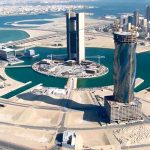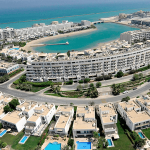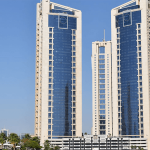There is no doubt that the real estate market has been growing in the GCC area exponentially over the last decade. It became more of a need than a luxury as the world is moving into the post-oil era, considering how oil has been the backbone for the GCC countries’ economies for a very long time. One of the most notable rising real estate markets in the region in the recent years is the real estate market of the Kingdom of Bahrain.
There are many reasons to which this rise can be attributed. For example, the Kingdom’s strategic location near the Kingdom of Saudi Arabia (the Arabian Peninsula largest economy), the tax system and the freehold areas it possesses. Unlike the other countries in the GCC region, Kingdom of Bahrain’s main income came from financial services, not oil industries. However, there are many obstacles of investment in Bahrain that could decelerate this potential growth over the upcoming years. In this article, we will discuss the most important of these blocks and the island kingdom’s potential to overcome them:
The Business Environment Outlook:
According to the World Bank report for doing business in Bahrain 2018, out of 190 countries indexed, the Kingdom of Bahrain ranks as the 75th easiest country to start business in; the 47th in dealing with construction permits; the 79th in getting electricity; the 25th in registering property.
On the other hand, the Kingdom of Bahrain scored low to moderate in getting credit (105th), protecting minority investors (108th), enforcing contracts (111th) and resolving insolvency (90th).
Overall, based on the aforementioned rankings, the Kingdom of Bahrain was ranked as the 66th easiest country to start your business in. With the aforementioned numbers in mind, let’s take a look at what are believed to be the general investment challenges and the main obstacles of investment in Bahrain:
-
Unavailability of Credit Information:

As mentioned previously, the Kingdom of Bahrain was ranked as the 105th country when it comes to the rights of borrowers and lenders. This is measured through two main group of indicators: the first of which measures the degree of facilitation of lending while second group measures the scope and the accessibility of the credit information.
Due to many factors, including the limited availability of the credit information for the lenders and the poor coverage of the credit bureau of the listed adults and firms and, on the other hand, the absence of strong regulatory system that protects the rights of the lenders and borrowers contributed to the low rank Kingdom of Bahrain has scored.
-
Limited protection for minor investors:

When it comes to the implemented legal procedures that aim at protecting small shareholders for the abuse of corporate assets by the companies’ directors, Kingdom of Bahrain was ranked the 108th.
In more details, this rank is determined based on six sub-indicators that determine the overall score of the quality of Bahrain’s procedures to protect minor investors: (1) Ease of shareholder suits index; (2) Extent of ownership control index; (3) Extent of director liability index; (4) Extent of corporate transparency index; (5) Extent of shareholders’ rights index; (6) Extent of disclosure index.
The Kingdom of Bahrain scored 4 out of 10 in the first three indicators, 5 out of 10 in the fourth and fifth indicators, and 8 out of 10 in the last indicator to achieve an overall quality index of 30. Although this is one of the highest scores in the region, it is considered to be moderate internationally.
-
Bureaucracy and poor enforcement of contracts:

This factor measures the performance of the judicial system and the quality of the practices it follows in commercial disputes. Mainly, the rank is determined based on the average time and cost for resolving these disputes.
According to the World Bank report, while the cost of the law suit constitutes the lowest cost percentage of the total claim value (14.7%) in the GCC region, the average time needed by the Bahraini judicial system is 635 days (the longest average duration in the GCC region) and the quality of the judicial processes and practices scored 4 out of 18 (second lowest quality index in the GCC region).
-
Insolvency Recovery:

Another important ranking factor which affects and is affected by the previous three is the outcome of entities’ insolvency. Mainly, this is indicated by measuring the time and the cost of the insolvency procedures, and the recovery rate (how many cents have been secured from each recovered dollar).
As for the Kingdom of Bahrain, average recovery rate was measured to be 41.9%, which is higher than the average recovery rate in the rest of the GCC countries (Second highest country is Oman with its rate being 38.1%), Iran (15.4%) and Middle East and North Africa (25.5%) region.
On the other hand, the Kingdom of Bahrain scored the lowest time (2.5 years) and the second lowest average cost percent of the entity’s value (9.5%) of insolvency procedures.
It is clear that the Kingdom of Bahrain is one of the strongest performers in the region when it comes to insolvency recovery. However, internationally, it scored a moderately low rank (90th out the of 190).
Now that we demonstrated the main factors that might affect the overall investment environment of of the island kingdom, there are two more specific factors that affect the real estate market in Bahrain.
Obstacles of real estate investment in Bahrain:
-
Marketing Campaigns:

Despite the Kingdom of Bahrain’s relative abundance of natural and historical monuments and tourist and investment attractions, they have not been capitalized on properly through strong marketing campaigns. This can be attributed to many reasons including the Kingdom’s relatively small capital.
Also, there is the fierce competition the Kingdom of Bahrain is getting from its neighbor countries which adapt aggressive strong marketing campaigns to brand themselves as the best investment attractions in the region.
-
Infrastructure Projects:

Another point that is considered one of the most significant obstacles of investment in Bahrain in the real estate market and for the kingdom’s economy in general is its low focus on developing infrastructural projects. This affects business sectors directly. On the other hand, other countries in the GCC region are paying increasing attention to the issue, which makes it even harder for the Kingdom of Bahrain to keep its competitive edge.
To summarize, the Kingdom of Bahrain has a great potential of being one of the best investment environments in the region that is backed by the fact that its main product has been financial services.
However, to overcome the main obstacles of investment in Bahrain efficiently, a strong body of regulations and laws that ensure all the investors (regardless of how small their contribution might be) and the creditors equal rights and equal chances is necessary. In addition to that, real estate market in Bahrain needs to be supported by strong marketing campaigns and critical infrastructure development projects.








.jpg)
.png)












.jpg)